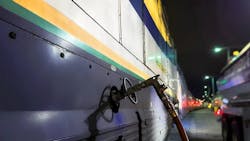TransLink West Coast Express fleet to be converted to renewable diesel system
TransLink is working to make a complete conversion to renewable diesel on its West Coast Express fleet to bring it one step closer to achieving its net-zero emissions goals. Renewable diesel comes from organic waste, such as used cooking oil, waste animal fats and vegetable oils. Renewable diesel also burns cleaner than fossil fuel diesel.
The conversion delivers a 97 percent greenhouse gas (GHG) reduction across the fuel life cycle, compared to fossil fuel diesel. In total, this means a 3,200-ton annual GHG reduction, or the equivalent of taking 940 cars off the road per year.
“Converting the West Coast Express to renewable diesel is an important step towards achieving a zero-emission future,” said TransLink CEO Kevin Quinn. “Customers can feel good knowing that each trip to and from the Fraser Valley is helping to reduce the region’s carbon footprint.”
Surrey Transit Center was the first bus depot to transition to renewable diesel in December 2023, followed by Port Coquitlam Transit Center and the Vancouver Transit Centre earlier this year.
The switch to renewable diesel is a part of TransLink’s Climate Action Strategy initiative which includes reducing GHGs 45 percent by 2030 (from 2010 levels). TransLink is working to operate a zero-emission bus fleet by 2040.
